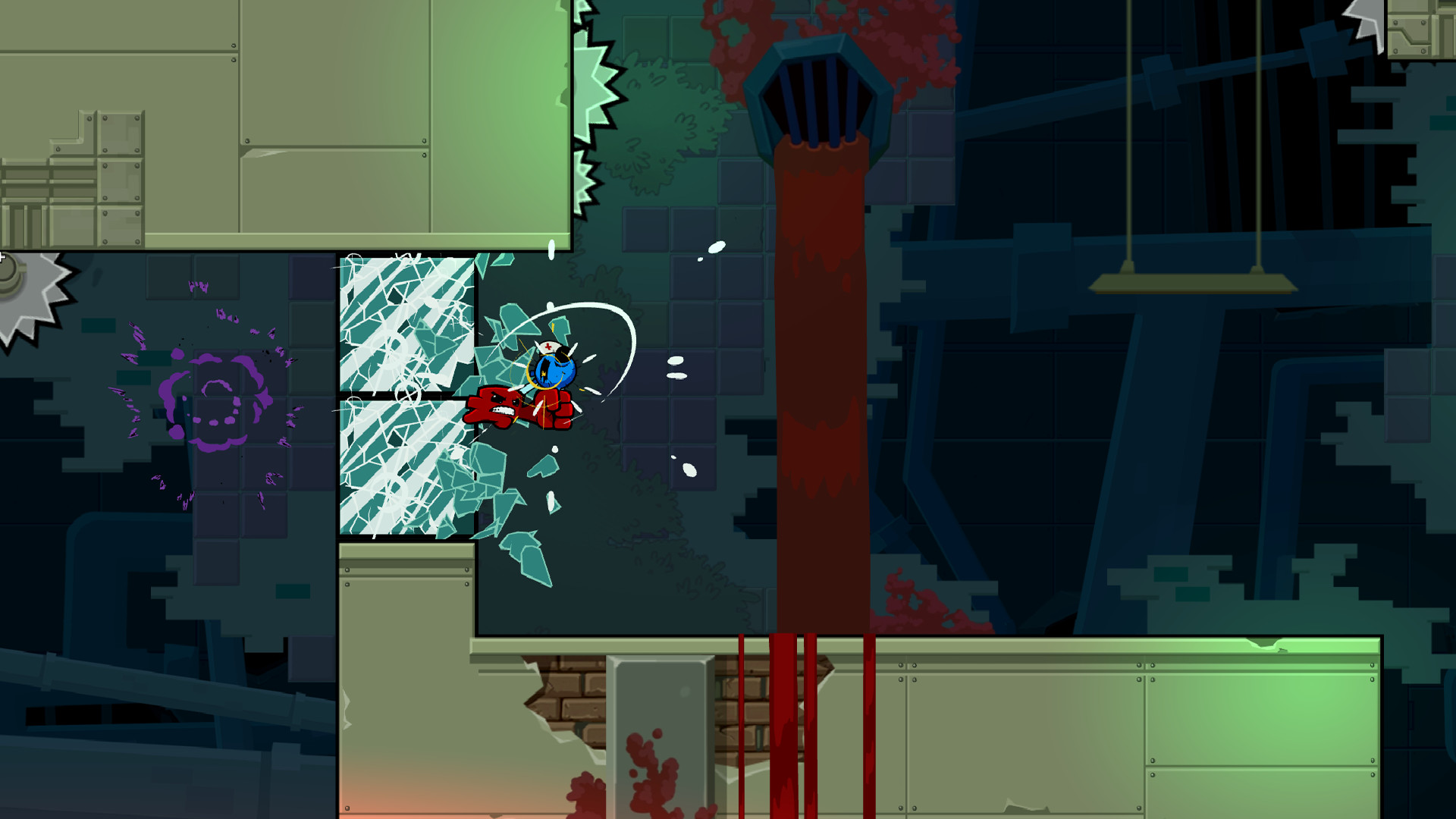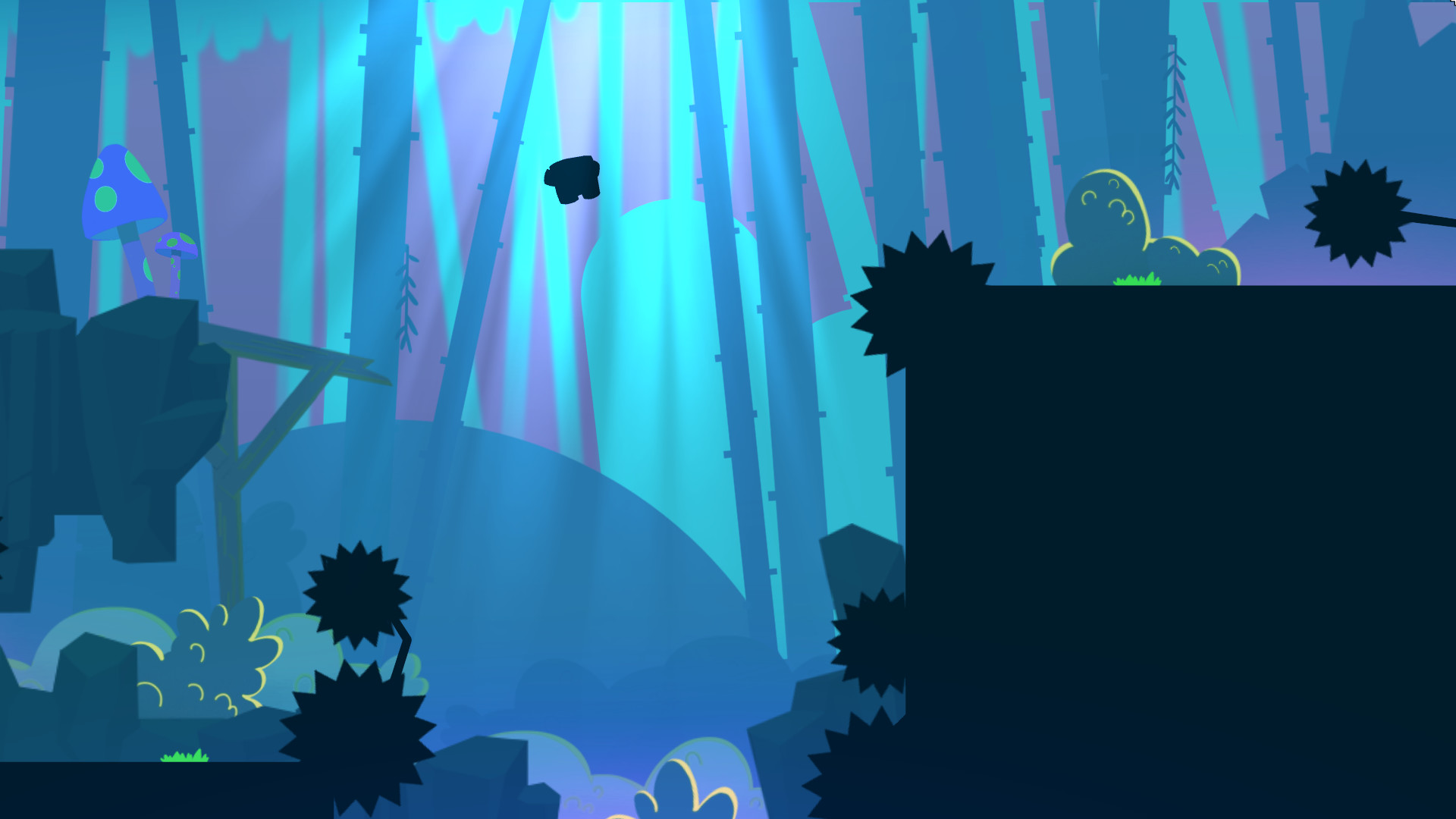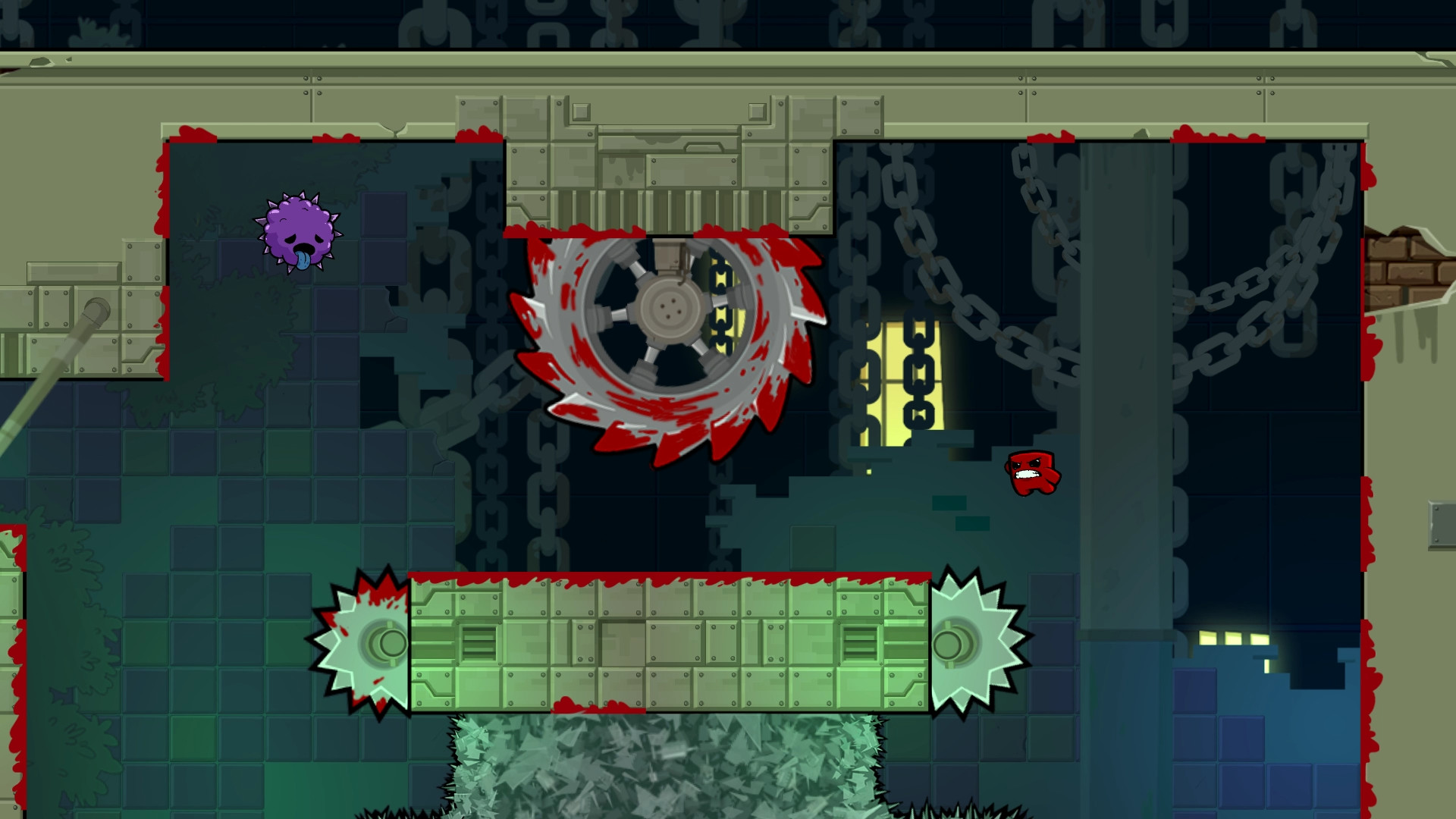Super Meat Boy Forever Interview – Controls, Levels, Story, and More
Back when the indie gaming boom was in its infancy, Team Meat’s Super Meat Boy was one of the first games to show the industry just what a small yet talented team could achieve with the right vision. With the perfect blend of challenge, charm, addictive design, and tightly crafted levels, Super Meat Boy was instantly recognized as a platformer for the ages. The road to its successor has been a long and winding one, but Super Meat Boy Forever is finally here. With more than a few rather major changes, it’s taking some interesting risks, and to learn more about them and the game’s development, we recently reached out to the people behind it. You can read our conversation with the game’s designer and Super Meat Boy co-creator Tommy Refenes below.
"I wanted to see if I could make a Meat Boy game that felt like Meat Boy that only used one button. So, at GDC 2011 in my hotel room, I took my laptop which had the original Super Meat Boy code on it, created a special version of the meat boy character that would always run and could change directions by jumping off walls."
Super Meat Boy Forever went through a long development cycle, starting off as a mobile port of the original and then morphing into something completely different as a full-fledged sequel. Can you talk us through that mid-development change, and what brought it about?
The game started as a challenge to myself in 2011. Around that time the App Store was exploding with really bad ports of classic games. You had stuff like Sonic and Mega Man that weren’t at all designed for the platform being put up there as is, with bad on-screen controls, just because the IP holders wanted to make a buck. At one point I called the App Store the Tiger Handheld of this generation because I felt the experience that companies (mainly larger companies) were putting out were not great representations of the IPs they represented… much like the Tiger Handheld games of the 90s. That was also shortly after Super Meat Boy launched and people really wanted an iOS/Android version, but in its then current state there was no way it would work but I kept thinking about it.
I wanted to see if I could make a Meat Boy game that felt like Meat Boy that only used one button. So, at GDC 2011 in my hotel room, I took my laptop which had the original Super Meat Boy code on it, created a special version of the meat boy character that would always run and could change directions by jumping off walls. I designed a few proof-of-concept levels and quickly realized that there really was some potential if the game was designed for the platform and not in spite of it.
Times have changed a lot since then. There are really great games on the App Store because developers understand how to design for the system and not try to shoehorn a design that works.
We ended up prototyping a version of the game around May 2014 and showing it at PAX West 2014 in September. It was pretty great, definitely different from what people were used to, but the game was fun. Unfortunately, shortly after that public unveiling all work stopped on the project and couldn’t be picked back up until 2017.
When 2017 came around I looked at the prototype again and thought that there was a really great game to be made there.
The original 2014 prototype was only supposed to have maybe 3 levels per chapter / light and dark and I think we were only planning on 3 chapters. It was going to be a really small game put out very quickly. I wanted to go bigger with it so I decided that I was going to make this into a much, much bigger game with tons of levels, cutscenes, the works. We worked for almost 4 years at a really healthy pace, no real crunch, no meltdowns, there were some deadlines, but we kept it pretty chill.
The original Super Meat Boy is widely regarded as one of the best platformers of recent years. Was it a daunting task to develop a sequel to a game with that kind of a legacy, especially with such a long gap between the two games’ releases?
It was daunting and it wasn’t daunting at all. There is a lot of legacy to live up to when it comes to the first one, which means expectations are almost completely unreachable, but at the same time we weren’t trying to outdo the first one. Instead, we were trying to continue the story and do something different with the gameplay. That made it easier to explore every aspect of development further than we would have if we just kept to the same design as the first one. The long gap wasn’t ideal, I would have rather this game come out sooner but there are just some things in life you cannot control.
Talk us through the process of crafting the story and new characters that take center stage in Super Meat Boy Forever. Level design and platforming mechanics are obviously king in a game such as this one, but how excited are you about the prospect of players getting to experience the narrative aspects of Forever?
One of my favorite aspects of Super Meat Boy Forever is the story. We went through an entire production cycle for the 30ish minutes of cutscenes we created. I wrote scripts, we storyboarded, we had rough animations, we had rough backgrounds, we did post-production, I made videos explaining the emotional direction of the score, and when everything was finished it was all edited together in Premiere. It was a really great experience for me to go from writing something in Scrivener to years later editing the final cutscenes in Premiere. It really fulfilled a dream of mine to basically make a movie. I hope to do it again because it was incredibly gratifying.
Making the characters for Super Meat Boy Forever was also a great experience. In the main story you have Nugget, who is Meat Boy and Bandage Girls little girl. She was written around the time my wife and I were trying for our first child (he’s 2 and a half years old now). I was personally terrified of having a kid but I knew I wanted to be a father. Nugget was a way to sort of make it real without fully making it real. Later in development and writing, the things Nugget does in the story and how she acts is really inspired by my son. Nugget is pretty much joy personified which is basically what my son is. He’s always smiling, he’s always happy, and when he’s sad your heart just breaks but you can easily make him happy again.
With this story I also got to turn Dr. Fetus from “a bad guy” to “a bad guy that maybe has something more to him” which sets him up great for a future game. I’m proud of how he evolved throughout the story in this game.
When it comes to the other characters, my favorite one is Meatsona. He doesn’t appear in the main story, but he is unlocked with a warpzone. Meatsona started off as a joke idea between myself and Paul, the lead animator. I knew we were going to have a Mortal Kombat-themed warpzone but I didn’t know of a good way to really honor Mortal Kombat in the art style we had. So, I jokingly suggested that I get a red stretchy suit and I’ll film myself doing all of the character animations in front of a green screen. We both laughed but I ended up buying the suit, then buying the gi, pasting a cut up Meat Boy shirt on the front of the gi, filming myself, then going frame by frame and cutting off my head to make the most ridiculous character I’ve ever created. He was just called “MK Boy” or “Fatality Boy” until Lillian, our social media / community person, suggested the name Meatsona. He was a joke that I believe has turned into a fan favorite because he’s so incredibly stupid.
"Forever’s approach to difficulty is the same as Super Meat Boy’s approach to difficulty. I have always stressed how important it is for level design and controls to be symbiotic."
Challenge was a crucial part of the original Super Meat Boy. What’s Forever’s approach to difficulty? What sort of a balance does it strike between challenge and accessibility, for both newcomers and returning fans?
Forever’s approach to difficulty is the same as Super Meat Boy’s approach to difficulty. I have always stressed how important it is for level design and controls to be symbiotic. The games that feel good get this 100%, the games that don’t are fighting with one or the other. Once you have controls that work well, then designing levels that push you to the limit of those controls without making you feel uncomfortable is how you create a good challenge. Super Meat Boy was known for being hard but fair. Forever is the same formula. We build levels that complement the controls.
The transition to becoming an auto-runner is one that’s raised a lot of eyebrows for fans of the original. What prompted that change? Can you talk us through the process of how that decision came about, and what ripple effects it has had on other aspects of the game?
I touched on that in the first question and the question above, so I’ll save some space by not reiterating those points here.
When it comes to a ripple effect though, I decided that everything needed to be done with two buttons. So that means the warpzones were all designed to play with two buttons, the bosses are designed to be fought with two buttons, everything gameplay wise is two buttons. The hardest design challenge with this were the bosses by far. The warpzones kind of have no rules so it’s easier to just shape the warpzone and the controls, but when it came to bosses a lot of thought went into how to design a boss fight that makes you forget you only have two buttons. I’m very proud of the bosses in this game. They’re fun and challenging and they fit the story while sticking to the core mechanic of the game.
Randomly generated levels in Forever have allowed the game to have a much wider pool of variety, but how do you as developer ensure that that doesn’t clash with handcrafted design, which can obviously be so important in a platformer?
I’ve seen this a lot from various outlets and I’m actually extremely flattered that people think we didn’t handcraft these levels and that I could somehow create an AI that not only understands how to make a good level but also understands how to decorate levels and make them look pretty. The truth of the matter is we did design handcrafted levels… literally thousands of them.
To understand what is randomly generated in Super Meat Boy Forever I need to define two terms:
A Chunk is a section of a level that we’ve designed and decorated by hand. These are usually about the size of a Super Meat Boy level from the 2010 game. They have a defined start and a defined end. We built these levels like you would build any level in any platformer. We iterated on the design until it felt right, made it look pretty, played through it to give it a par and a difficulty rating.
A Level is a collection of 8 Chunks. Each Level has between 70 and 100 Chunks that it can choose from. That means we made 70 to 100 Super Meat Boy sized chunks per level. 1-1 has their own collection of 100, 1-2 has 100, etc, etc. For reference, Super Meat Boy had approximately 300 levels total. We have 300 in chunks in the first 3 levels of the game. To call it a massive undertaking would barely do it justice.
When playing through a Level in Super Meat Boy Forever, we randomly pull from that Level’s library of Chunks, randomly determine if there should be a pacifier or a warpzone, order them by difficulty and then add up all of their par times to get a par for the Level.
So for example, let’s say you’re playing Level 1-1 in Chipper Grove. When you start the level the game randomly pulls 6 chunks from 1-1’s chunk library and smashes them together to create the level you play.
Now let’s say you beat the game and do New Game Plus. When you load Level 1-1 again it’s a different level because it is pulling 6 different chunks. This new level could have a pacifier or a warpzone in it. We keep track to avoid duplicates so you can play through the game several times and not see duplicate chunks.
So the game isn’t randomly generated in the sense that it’s creating levels based on an algorithm, instead it’s randomly giving you levels that we’ve handcrafted.
"There is another game planned in the “Meat Boy Cinematic Universe” but it won’t be like Super Meat Boy or Super Meat Boy Forever. It’ll be an entirely different genre. We set it up in the story for Super Meat Boy Forever though, so it isn’t really a secret after you beat the game."
Roughly how long is an average playthrough of Super Meat Boy Forever?
I think the average playthrough just starting out is probably 2-3 hours on New Game if you only go through light world, then it drastically increases if you also do dark world and then increases even more if you want to unlock everything. At that point it then multiplies from there if you do New Game plus a few times. Most of the people on our discord have over 10 hours on their save games.
To 726% the game (the highest percentage you can get, unlock everything, etc) is a huge undertaking. I do know the first person to 726% it played it like crazy on launch day and it was a few days after the game came out before they reached that milestone. I’d say if you were a super genius platforming savant you could expect at least 10 hours of solid gameplay to unlock everything. Then if you want to New Game plus and play through literally everything we’ve made I think you have several days’ worth of gameplay ahead of you.
Are there any plans to have a more traditional follow-up to Super Meat Boy?
Not really. There is another game planned in the “Meat Boy Cinematic Universe” but it won’t be like Super Meat Boy or Super Meat Boy Forever. It’ll be an entirely different genre. We set it up in the story for Super Meat Boy Forever though, so it isn’t really a secret after you beat the game.
When can we expect the PS5, Xbox Series S and Xbox Series X versions?
Probably late January early February.
What kind of graphical enhancements can we expect on those platforms?
Super Meat Boy Forever is pretty heavy on the vector graphics so we will support 4K on those platforms. Not much else we can do though. Maybe we’ll make a new character called Ray Traceman and he’s just a puddle that reflects the world accurately in real time.
What frame rate and resolution does the game run on them?
1080p at 60hz to 4K at 60hz.
"Super Meat Boy Forever is pretty heavy on the vector graphics so we will support 4K on PS5 and Xbox Series X/S."
The PS5 features an incredibly fast SSD with 5.5GB/s raw bandwidth, which is faster than anything that is available out there. How are you taking advantage of this? How does this compare to Series X’s 2.4GB/s raw bandwidth SSD?
Our load times are already really low, even on Nintendo Switch so I feel like the PS5/Series X will just insta-load like it does on my PC with NVMe SSD drives.
The Xbox Series S features lesser hardware compared to Xbox Series X, and Microsoft is pushing it as a 1440p/60fps console. Do you think it will hold up for the graphically intensive next-gen games?
Yeah, I think it will. I mean you may have a few less effects, some crustier looking shadows and puddles and stuff but overall having a game run at 1440p at 60FPS is pretty great. It might make a difference in 5-8 years, but I imagine by then even the Series X and PS5 will be nearing the end of their life cycle if they haven’t already been upstaged by their respective bigger, better versions.
from Video Game News, Reviews, Walkthroughs And Guides | GamingBolt https://ift.tt/3bPwKIM
via Gamers Online









Post a Comment